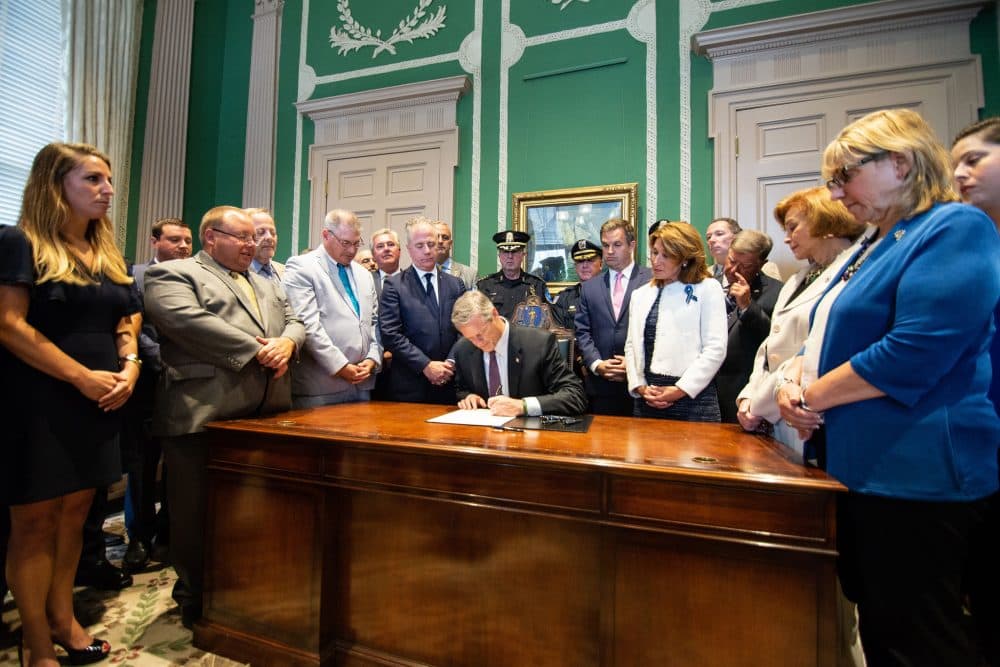Advertisement
Baker Approves Benefits For Locked-Out Union Gas Workers

With some gas workers facing the expiration of unemployment benefits within weeks as the National Grid lockout stretches into 2019, Gov. Charlie Baker on Monday morning signed an extension of those benefits and gave union members a small victory to close out 2018.
Locked-out workers from United Steelworkers Locals 12003 and 12012, enmeshed in tough contract negotiations since spring and locked off the job since June 25, were due to exhaust their unemployment benefits in mid-January. Though Baker won praise from the unions for it, signing the bill ran counter to the wishes of the business lobby, which has at times been irked with the governor.
United Steelworkers Local 12012 President John Buonopane said the bill, which calls for benefits to be extended for 26 weeks or until a lockout has ended, will be a "critical lifeline" for his union's members and their families.
The unions were planning to rally at the State House on Monday to implore Baker to sign the bill. Standing on Beacon Street with about 100 workers, Buonopane said the unions will instead use the visit to the State House to thank legislators who supported the bill and the workers.
"Our members are really thankful, especially on this day, the last day of the year. I've heard more than one person say this has been a long year and this is, on the last day, this is probably the best day," he told the News Service. "It really comes down to — you may not believe this but it's not even all about the economic part of this bill. It's about knowing that the people, the leadership of this state, are on their side and behind them, they have their backs. It means a lot, it really does."
Baker was on board with the Legislature as it explored ways to help locked-out workers and has for the last week said the benefits extension bill was under careful review. He expressed some apprehension about setting what he called "an unusual precedent" of having state government involve itself in a private business dispute and has continually urged National Grid and the unions to end the lockout.
"Today, hardworking families can be assured that they will continue to receive benefits while this lock out continues," Senator Mark Montigny said in a statement. "This legislation sends a strong message to employers that involuntary lock outs should never be used as a negotiating tactic to essentially starve workers into submission."
In signing the bill Monday, Baker said it will help contribute to the safety of the state's natural gas system in tandem with a gas safety bill that still needs a final Senate vote to get to his desk.
Advertisement
"The integrity of the Commonwealth's energy infrastructure is hugely important to the safety of the people of Massachusetts and this law, coupled with the bill our administration filed to require additional oversight of all natural gas projects, significantly increases accountability for all utility companies, and will help ensure that utilities use experienced crews with the proper supervision on all projects," Baker said in a statement. "I eagerly await the Legislature's approval of our bill to strengthen natural gas safety procedures and urge both National Grid and the Steelworkers union to swiftly reach consensus so that utility customers can receive the level of service and safety they deserve."
The bill Baker signed into law Monday is not exclusive to the National Grid lockout and its costs will be spread across the many businesses that pay into the state's unemployment insurance program. Baker again went against the wishes of the business community in signing the benefits extension.
"Our opposition arises out of a concern for the integrity of the unemployment insurance (UI) system and a fear that employers not directly involved in the labor dispute giving rise to the bill will be forced to pay for some portion of the costs of these additional benefits via the UI solvency assessment. This is, in effect, a tax on those employers," Associated Industries of Massachusetts Executive Vice President John Regan wrote to the governor last week with a request to veto the bill.
Lawmakers considered plans that would have required any employer who locked out its workers to pay for extended benefits but ultimately agreed instead on legislation requiring extended benefit costs to be covered by all employers who pay into the unemployment insurance system.
"AIM further believes that this legislation, in fact any bills targeting specific labor disputes, would both slow negotiations and set an unwise precedent of the Commonwealth involving itself in these matters," Regan wrote.
Buonopane said Monday he was not sure if or how the signing of the benefits extension bill would affect the ongoing contract talks with National Grid, which are scheduled to resume on Wednesday.
"There are still a number of issues that we have to work through — just knowing that if National Grid doesn't end the lockout, if National Grid continues the hard bargaining with the union that they've been pursuing now for over six months, at least our people will have some type of economic lifeline," he said.
Buonopane declined to offer specifics about where the negotiations stand.
National Grid and the unions had announced a "shared intent" to agree on a new contract by Friday, Dec. 28, but that deadline passed without a deal despite hours of private talks. The utility company presented a revised offer at 11:30 p.m. Friday and the two sides agreed to give the unions time to review the offer before formally responding.
National Grid has said its five-year contract offer — including wage increases totaling 14.5 percent and a no-layoff guarantee to all employees with five-plus years of service — compares favorably to the contracts of other utility workers, while the steelworkers' union asserts the offer is unfair to workers and scales back pension offerings. Health and pension benefits for future employees have been sticking points in the months-long talks.